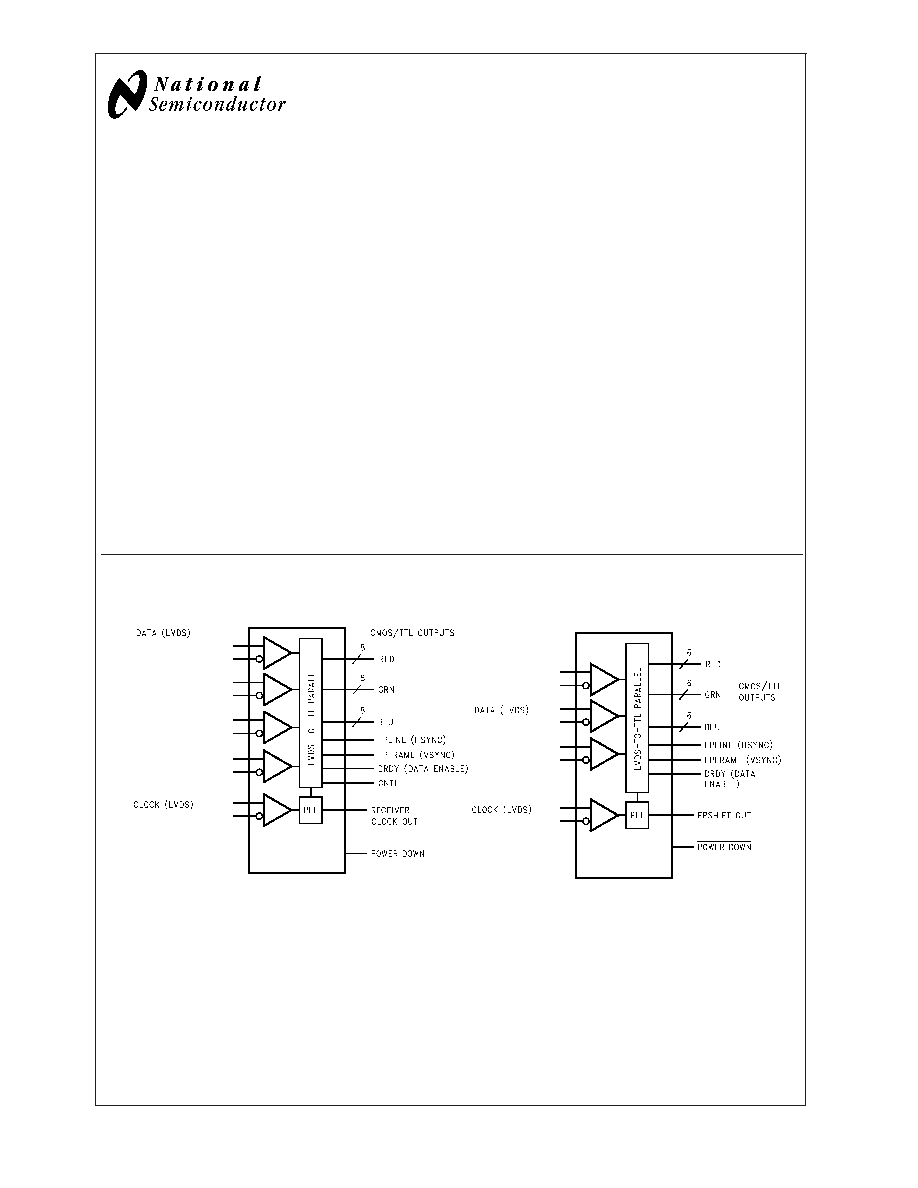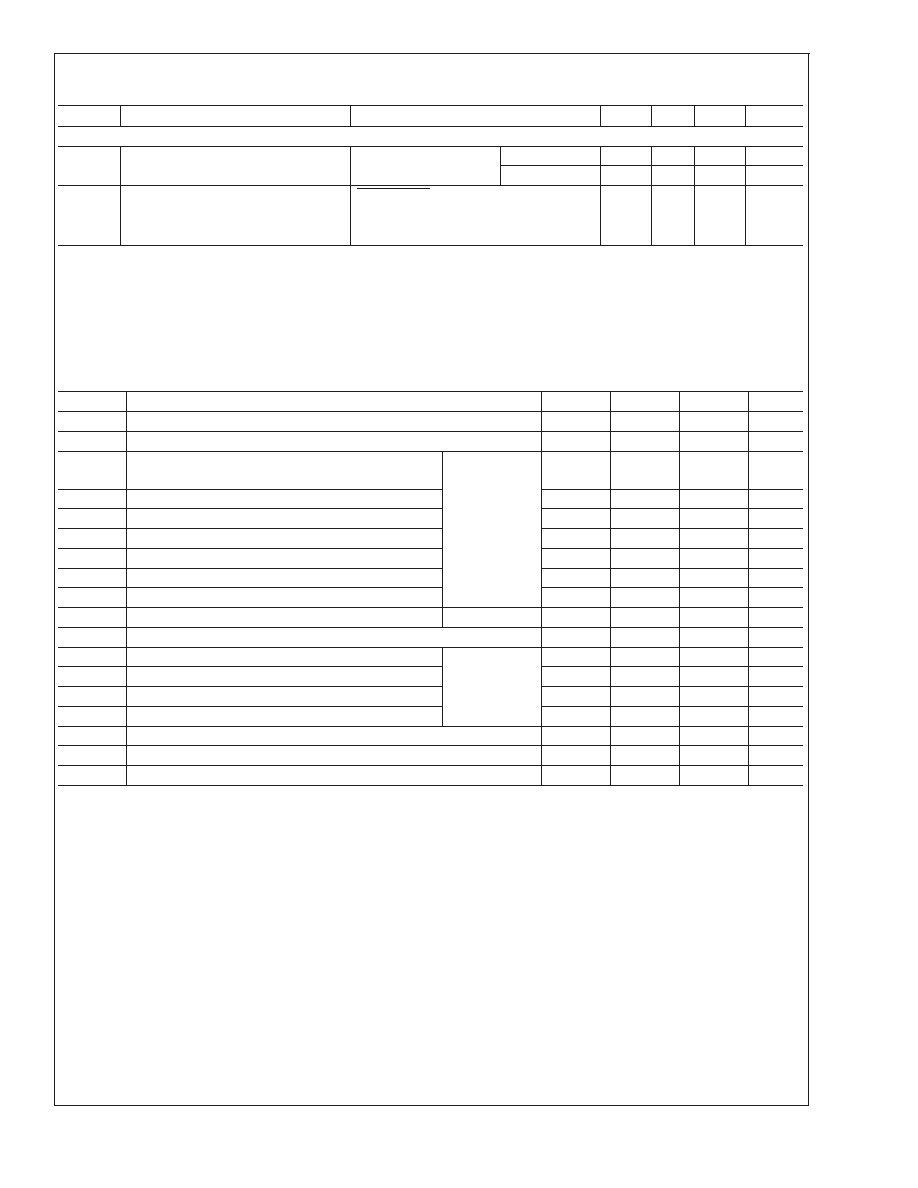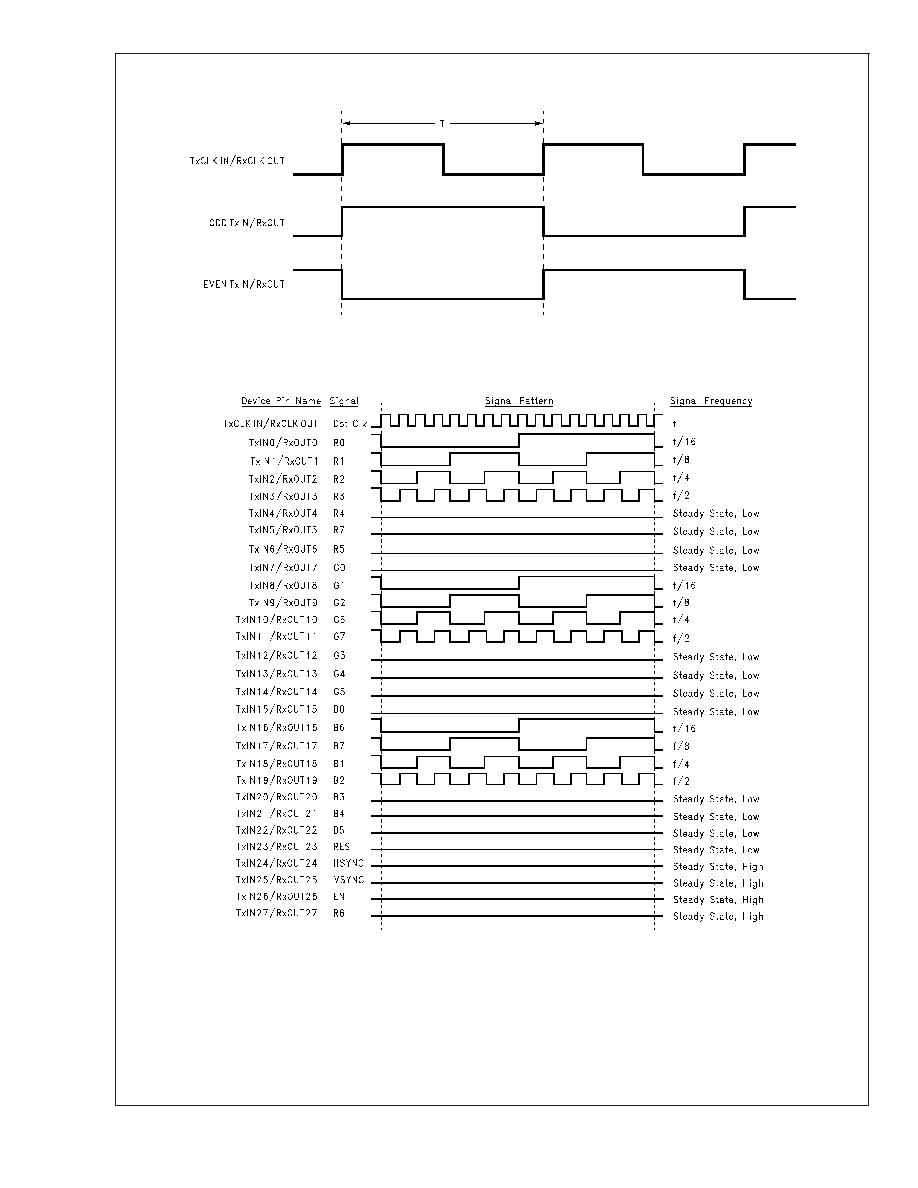
DS90CF386/DS90CF366
+3.3V LVDS Receiver 24-Bit Flat Panel Display (FPD)
Link--85 MHz,
+3.3V LVDS Receiver 18-Bit Flat Panel
Display (FPD) Link--85 MHz
General Description
The DS90CF386 receiver converts the four LVDS data
streams (Up to 2.38 Gbps throughput or 297.5 Megabytes/
sec bandwidth) back into parallel 28 bits of CMOS/TTL data
(24 bits of RGB and 4 bits of Hsync, Vsync, DE and CNTL).
Also available is the DS90CF366 that converts the three
LVDS data streams (Up to 1.78 Gbps throughput or 223
Megabytes/sec bandwidth) back into parallel 21 bits of
CMOS/TTL data (18 bits of RGB and 3 bits of Hsync, Vsync
and DE). Both Receivers' outputs are Falling edge strobe. A
Rising edge or Falling edge strobe transmitter (DS90C385/
DS90C365) will interoperate with a Falling edge strobe Re-
ceiver without any translation logic.
The DS90CF386 is also offered in a 64 ball, 0.8mm fine pitch
ball grid array (FBGA) package which provides a 44 %
reduction in PCB footprint compared to the 56L TSSOP
package.
This chipset is an ideal means to solve EMI and cable size
problems associated with wide, high speed TTL interfaces.
Features
n
20 to 85 MHz shift clock support
n
Rx power consumption
<
142 mW (typ)
@
85MHz
Grayscale
n
Rx Power-down mode
<
1.44 mW (max)
n
ESD rating
>
7 kV (HBM),
>
700V (EIAJ)
n
Supports VGA, SVGA, XGA and Single Pixel SXGA.
n
PLL requires no external components
n
Compatible with TIA/EIA-644 LVDS standard
n
Low profile 56-lead or 48-lead TSSOP package
n
DS90CF386 also available in a 64 ball, 0.8mm fine pitch
ball grid array (FBGA) package
Block Diagrams
DS90CF386
DS90CF366
10108527
Order Number DS90CF386MTD or DS90CF386SLC
See NS Package Number MTD56 or SLC64A
10108528
Order Number DS90CF366MTD
See NS Package Number MTD48
TRI-STATE
Æ
is a registered trademark of National Semiconductor Corporation.
May 2003
DS90CF386/DS90CF366
+3.3V
L
VDS
Receiver
24-Bit-Color
Flat
Panel
Display
(FPD)
Link
--
8
5
MHz,
+3.3V
L
VDS
Receiver
18-Bit-Color
Flat
Panel
Display
(FPD)
Link
--
8
5
MHz
© 2003 National Semiconductor Corporation
DS101085
www.national.com

Absolute Maximum Ratings
(Note 1)
If Military/Aerospace specified devices are required,
please contact the National Semiconductor Sales Office/
Distributors for availability and specifications.
Supply Voltage (V
CC
)
-0.3V to +4V
CMOS/TTL Output Voltage
-0.3V to (V
CC
+ 0.3V)
LVDS Receiver Input Voltage
-0.3V to (V
CC
+ 0.3V)
Junction Temperature
+150∞C
Storage Temperature
-65∞C to +150∞C
Lead Temperature
(Soldering, 4 sec for TSSOP)
+260∞C
Solder Reflow Temperature
(Soldering, 20 sec for FBGA)
+220∞C
Maximum Package Power
Dissipation Capacity
@
25∞C
MTD56 (TSSOP) Package:
DS90CF386MTD
1.61 W
MTD48 (TSSOP) Package:
DS90CF366MTD
1.89 W
Package Derating:
DS90CF386MTD
12.4 mW/∞C above +25∞C
DS90CF366MTD
15 mW/∞C above +25∞C
Maximum Package Power
Dissipation Capacity
@
25∞C
SLC64A Package:
DS90CF386SLC
2.0 W
Package Derating:
DS90CF386SLC
10.2 mW/∞C above +25∞C
ESD Rating
(HBM, 1.5 k
, 100 pF)
>
7 kV
(EIAJ, 0
, 200 pF)
>
700V
Recommended Operating
Conditions
Min Nom Max Units
Supply Voltage (V
CC
)
3.0
3.3
3.6
V
Operating Free Air
Temperature (T
A
)
-10
+25
+70
∞C
Receiver Input Range
0
2.4
V
Supply Noise Voltage (V
CC
)
100
mV
PP
Electrical Characteristics
Over recommended operating supply and temperature ranges unless otherwise specified.
Symbol
Parameter
Conditions
Min
Typ
Max
Units
CMOS/TTL DC SPECIFICATIONS
V
IH
High Level Input Voltage
2.0
VCC
V
V
IL
Low Level Input Voltage
GND
0.8
V
V
OH
High Level Output Voltage
I
OH
= - 0.4 mA
2.7
3.3
V
V
OL
Low Level Output Voltage
I
OL
= 2 mA
0.06
0.3
V
V
CL
Input Clamp Voltage
I
CL
= -18 mA
-0.79
-1.5
V
I
IN
Input Current
V
IN
= 0.4V, 2.5V or V
CC
+1.8
+15
uA
V
IN
= GND
-10
0
uA
I
OS
Output Short Circuit Current
V
OUT
= 0V
-60
-120
mA
LVDS RECEIVER DC SPECIFICATIONS
V
TH
Differential Input High Threshold
V
CM
= +1.2V
+100
mV
V
TL
Differential Input Low Threshold
-100
mV
I
IN
Input Current
V
IN
= +2.4V, V
CC
= 3.6V
±
10
µA
V
IN
= 0V, V
CC
= 3.6V
±
10
µA
RECEIVER SUPPLY CURRENT
ICCRW
Receiver Supply Current
C
L
= 8 pF,
f = 32.5 MHz
49
70
mA
Worst Case
Worst Case Pattern,
f = 37.5 MHz
53
75
mA
DS90CF386 (Figures 1,
4 )
f = 65 MHz
81
114
mA
f = 85 MHz
96
135
mA
ICCRW
Receiver Supply Current
C
L
= 8 pF,
f = 32.5 MHz
49
60
mA
Worst Case
Worst Case Pattern,
f = 37.5 MHz
53
65
mA
DS90CF366 (Figures 1,
4 )
f = 65 MHz
78
100
mA
f = 85 MHz
90
115
mA
ICCRG
Receiver Supply Current,
C
L
= 8 pF,
f = 32.5 MHz
28
45
mA
16 Grayscale
16 Grayscale Pattern,
f = 37.5 MHz
30
47
mA
DS90CF386/DS90CF366
www.national.com
2

Electrical Characteristics
(Continued)
Over recommended operating supply and temperature ranges unless otherwise specified.
Symbol
Parameter
Conditions
Min
Typ
Max
Units
RECEIVER SUPPLY CURRENT
(Figures 2, 3, 4 )
f = 65 MHz
43
60
mA
f = 85 MHz
43
70
mA
ICCRZ
Receiver Supply Current
Power Down = Low
140
400
µA
Power Down
Receiver Outputs Stay Low during
Power Down Mode
Note 1: "Absolute Maximum Ratings" are those values beyond which the safety of the device cannot be guaranteed. They are not meant to imply that the device
should be operated at these limits. The tables of "Electrical Characteristics" specify conditions for device operation.
Note 2: Typical values are given for V
CC
= 3.3V and T
A
= +25C.
Note 3: Current into device pins is defined as positive. Current out of device pins is defined as negative. Voltages are referenced to ground unless otherwise
specified (except V
OD
and
V
OD
).
Receiver Switching Characteristics
Over recommended operating supply and temperature ranges unless otherwise specified
Symbol
Parameter
Min
Typ
Max
Units
CLHT
CMOS/TTL Low-to-High Transition Time (Figure 4 )
2.0
3.5
ns
CHLT
CMOS/TTL High-to-Low Transition Time (Figure 4 )
1.8
3.5
ns
RSPos0
Receiver Input Strobe Position for Bit 0 (Figure 11,
Figure 12 )
f = 85 MHz
0.49
0.84
1.19
ns
RSPos1
Receiver Input Strobe Position for Bit 1
2.17
2.52
2.87
ns
RSPos2
Receiver Input Strobe Position for Bit 2
3.85
4.20
4.55
ns
RSPos3
Receiver Input Strobe Position for Bit 3
5.53
5.88
6.23
ns
RSPos4
Receiver Input Strobe Position for Bit 4
7.21
7.56
7.91
ns
RSPos5
Receiver Input Strobe Position for Bit 5
8.89
9.24
9.59
ns
RSPos6
Receiver Input Strobe Position for Bit 6
10.57
10.92
11.27
ns
RSKM
RxIN Skew Margin (Note 4) (Figure 13 )
f = 85 MHz
290
ps
RCOP
RxCLK OUT Period (Figure 5)
11.76
T
50
ns
RCOH
RxCLK OUT High Time (Figure 5 )
f = 85 MHz
4.5
5
7
ns
RCOL
RxCLK OUT Low Time (Figure 5)
4.0
5
6.5
ns
RSRC
RxOUT Setup to RxCLK OUT (Figure 5 )
2.0
ns
RHRC
RxOUT Hold to RxCLK OUT (Figure 5 )
3.5
ns
RCCD
RxCLK IN to RxCLK OUT Delay
@
25∞C, V
CC
= 3.3V (Figure 6 )
5.5
7.0
9.5
ns
RPLLS
Receiver Phase Lock Loop Set (Figure 7 )
10
ms
RPDD
Receiver Power Down Delay (Figure 10 )
1
µs
Note 4: Receiver Skew Margin is defined as the valid data sampling region at the receiver inputs. This margin takes into account the transmitter pulse positions (min
and max) and the receiver input setup and hold time (internal data sampling window - RSPos). This margin allows for LVDS interconnect skew, inter-symbol
interference (both dependent on type/length of cable), and clock jitter (less than 150 ps).
DS90CF386/DS90CF366
www.national.com
3

AC Timing Diagrams
10108502
FIGURE 1. "Worst Case" Test Pattern
10108512
FIGURE 2. "16 Grayscale" Test Pattern (DS90CF386)(Notes 5, 6, 7, 8)
DS90CF386/DS90CF366
www.national.com
4

AC Timing Diagrams
(Continued)
Note 5: The worst case test pattern produces a maximum toggling of digital circuits, LVDS I/O and CMOS/TTL I/O.
Note 6: The 16 grayscale test pattern tests device power consumption for a "typical" LCD display pattern. The test pattern approximates signal switching needed
to produce groups of 16 vertical stripes across the display.
Note 7: Figures 1, 3 show a falling edge data strobe (TxCLK IN/RxCLK OUT).
Note 8: Recommended pin to signal mapping. Customer may choose to define differently.
10108503
FIGURE 3. "16 Grayscale" Test Pattern (DS90CF366)(Notes 5, 6, 7, 8)
10108504
FIGURE 4. DS90CF386/DS90CF366 (Receiver) CMOS/TTL Output Load and Transition Times
10108505
FIGURE 5. DS90CF386/DS90CF366 (Receiver) Setup/Hold and High/Low Times
DS90CF386/DS90CF366
www.national.com
5




